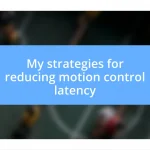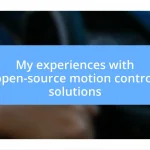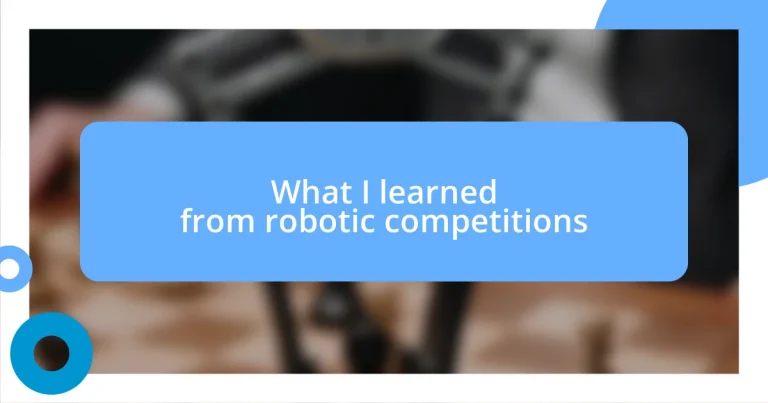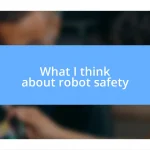Key takeaways:
- Robotic competitions emphasize the importance of collaboration, flexibility, and effective problem-solving among team members to overcome challenges.
- Preparation strategies, including setting clear priorities and engaging with mentors, significantly enhance performance and reduce stress during competitions.
- The future of robotics competitions is poised for innovation, incorporating technologies like AI and fostering global collaboration, leading to diverse opportunities for growth and learning.
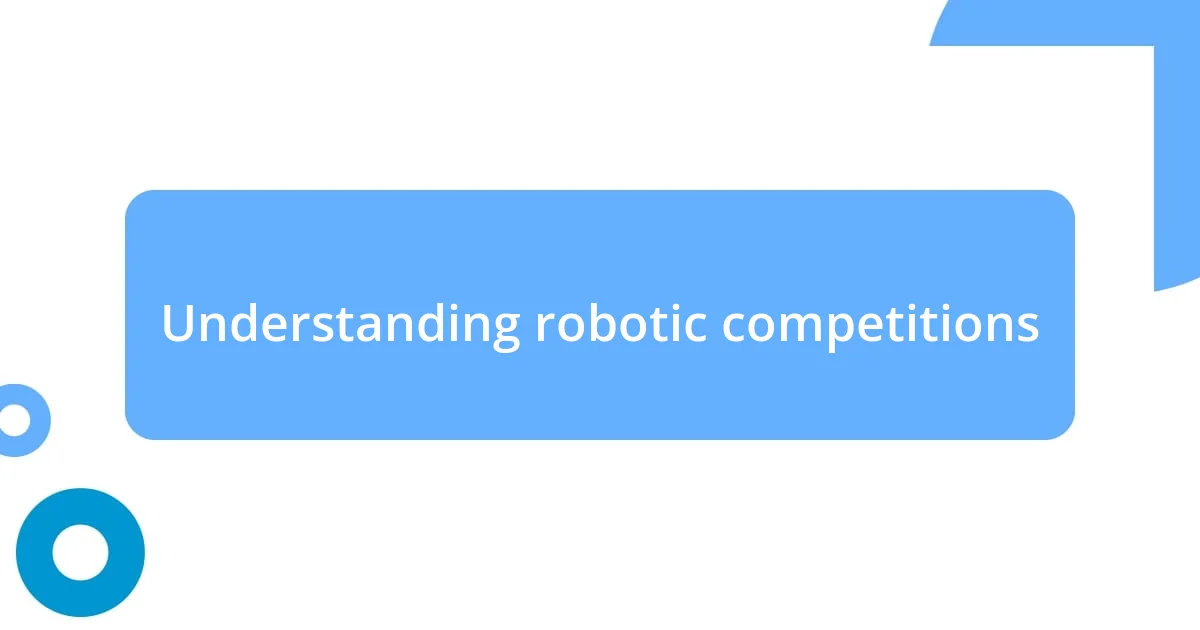
Understanding robotic competitions
Robotic competitions are exhilarating events where teams design and build robots to compete in various challenges. I remember the first time I stepped into a competition venue—it felt like entering an entirely new world, bustling with excitement and innovation. Have you ever felt that rush of adrenaline when you see your hard work come to life on the battlefield of technology?
These competitions often require a blend of engineering prowess and creative problem-solving. I’ve learned that the true challenge lies not just in building the robot but in strategizing its function in real-time. How do you ensure your robot can adapt to unforeseen obstacles? Watching teams adjust their plans on the fly taught me that flexibility is just as crucial as technical skills.
Through my experiences, I’ve found that collaboration is key. Each team member brings unique strengths, and it’s fascinating to see how different skill sets can come together to create something extraordinary. Have you ever witnessed a team triumph against the odds? That moment when a robot successfully completes a task after countless trials feels like pure magic, a testament to teamwork and perseverance.
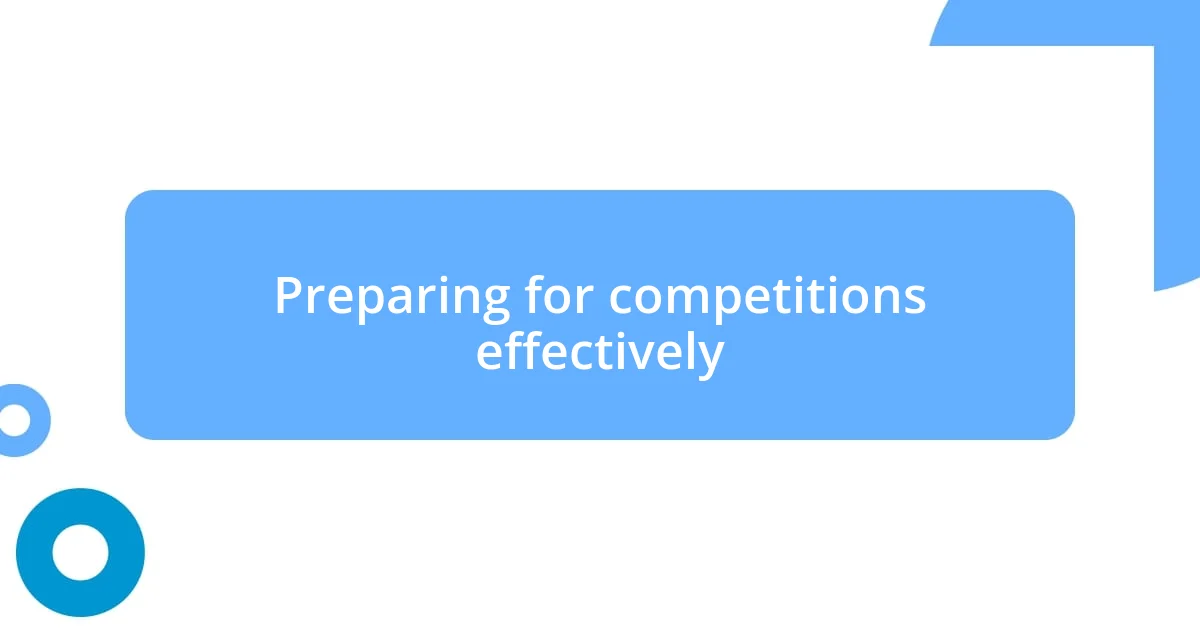
Preparing for competitions effectively
Preparing for competitions effectively requires a solid plan. I recall a time when my team and I were overwhelmed with ideas as the competition day approached. We realized that setting clear priorities for our robot’s functionality and design was essential. Without that focus, we found ourselves veering off course. It’s like packing for a trip; if you don’t know your destination, you’ll pack unnecessary things.
Time management also plays a pivotal role. From my experience, creating a timeline to allocate time for build, testing, and revisions kept our stress levels at bay. I remember the relief of having buffer periods for troubleshooting—those extra days saved our project more than once! Have you ever had that moment when a last-minute tweak just clicks? It’s incredibly satisfying when everything falls into place.
Finally, staying connected with mentors and peers can greatly enhance your preparations. I often reached out to veteran participants who shared valuable tips on navigating their own challenges. Their insights not only guided us but also instilled a sense of community in the competition. Engaging in discussions about potential strategies made me feel more confident about our approach. How about you? Have you ever relied on someone else’s experience to shore up your own preparations?
| Preparation Aspect | My Experience |
|---|---|
| Setting Clear Priorities | Focus helps avoid distractions. |
| Time Management | Buffer periods saved us stress. |
| Engaging with Mentors | Community support instilled confidence. |
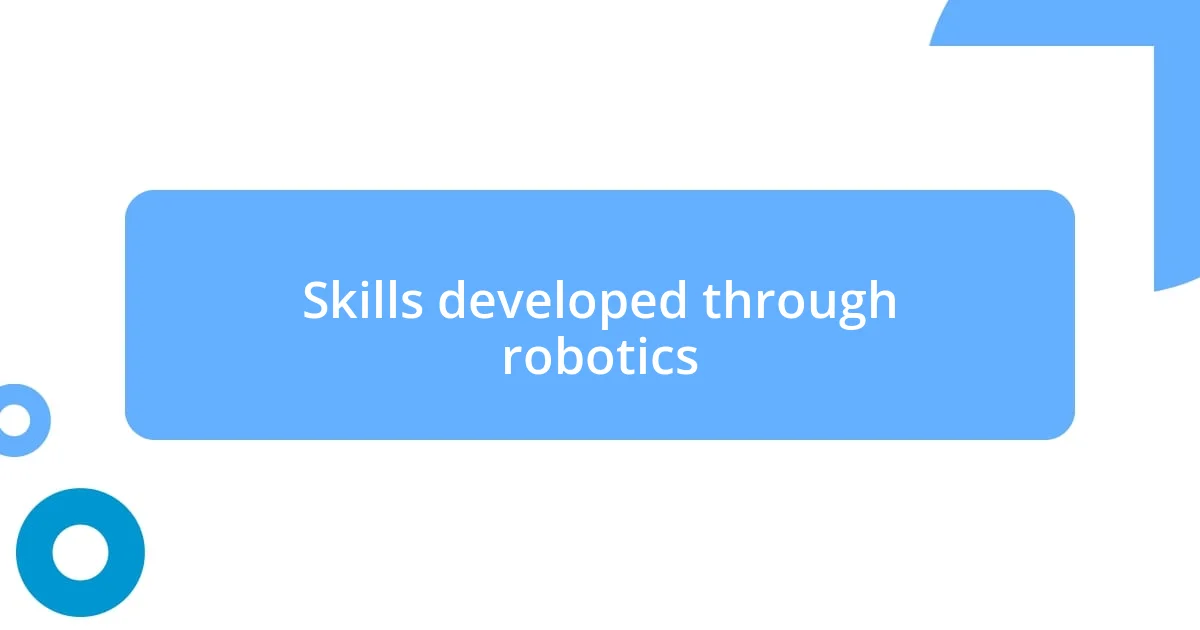
Skills developed through robotics
Robotics competitions foster a wide array of skills that can significantly impact personal and professional growth. I can attest that technical skills are a major focus; I remember the thrill of coding a bot to perform specific tasks. Each line of code felt like a step into a grand puzzle. But beyond the technical, I grew in areas like teamwork and project management. Those late-night brainstorming sessions weren’t just about solving problems; they were about learning to listen and collaborate, often leading to breakthroughs I could never have achieved alone.
Skills I developed through robotics include:
- Technical Proficiency: Handling software and hardware components dramatically improved my understanding of technology.
- Problem-Solving: Each setback taught me to analyze and pivot, turning challenges into learning opportunities.
- Teamwork: Collaborating with diverse personalities helped me appreciate different perspectives and strengths.
- Communication: Explaining complex ideas became second nature, as we often had to present our strategies and results.
- Adaptability: Learning to adjust plans in real-time based on unforeseen circumstances became a vital skill I still rely on today.
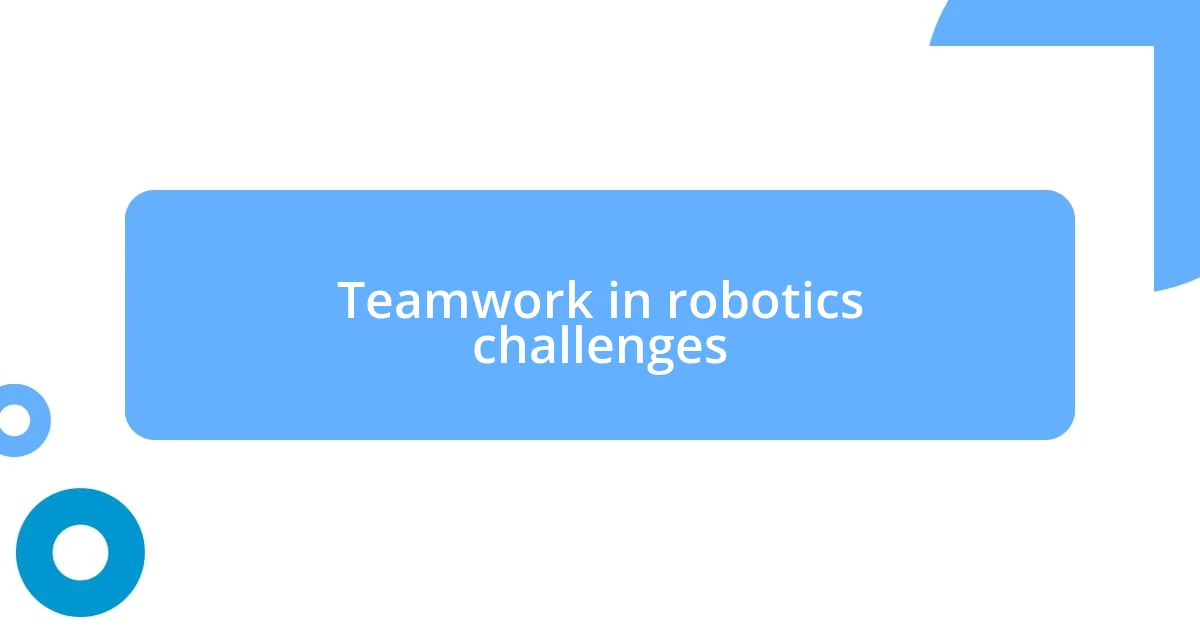
Teamwork in robotics challenges
Working on a robotics team has taught me that collaboration can lead to extraordinary outcomes. I remember a challenge where we had to integrate a complex sensor system. While I had my own ideas, it was the brainstorming session with my teammates that sparked the breakthrough we needed. Isn’t it fascinating how sharing perspectives can illuminate possibilities we never considered before?
When tasks were divided based on each member’s strengths, I felt a sense of trust develop within our team. My friend, who was great at design, brought creativity that complemented my technical skills. This dance of talent not only made our robot better but also made the entire process enjoyable. Have you ever felt that synergy when working closely with a group? It’s such a powerful experience.
I also learned that effective communication is the backbone of teamwork. There were moments when miscommunication led to some funny mishaps—like when we accidentally programmed the robot to spin out of control! It taught me that expressing thoughts clearly and actively listening to others is vital. How often do we underestimate the importance of open dialogue? I believe that fostering an environment where everyone feels heard is key to overcoming obstacles together.
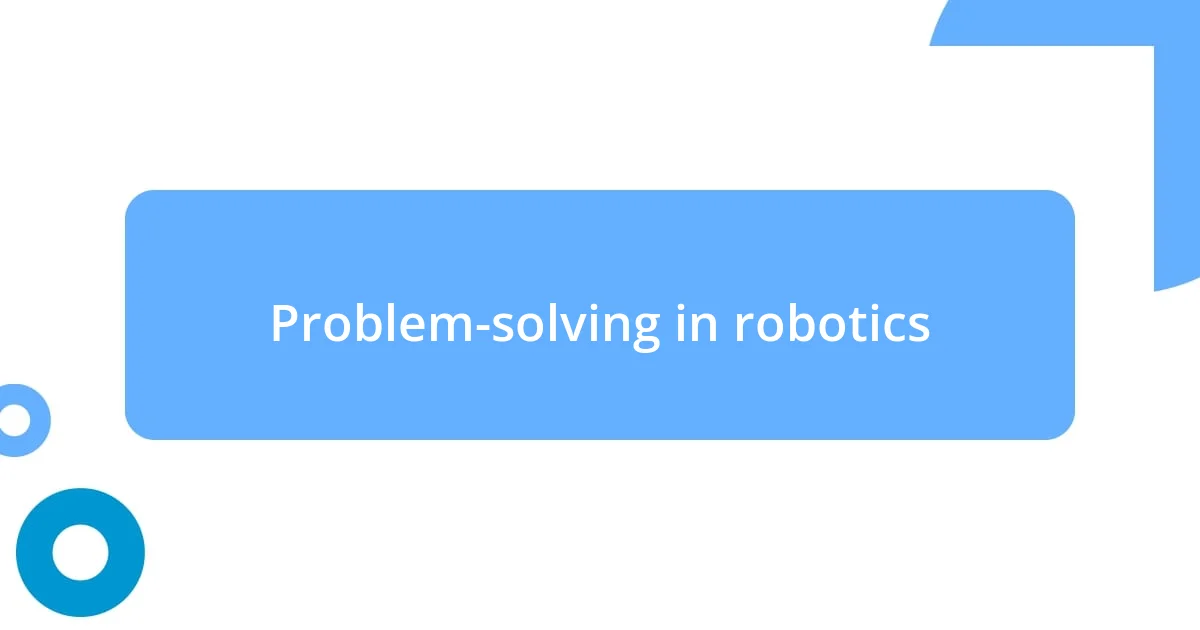
Problem-solving in robotics
Problem-solving in robotics is a journey that has taught me to embrace challenges as opportunities. I recall a particularly tense night before a competition where our robot malfunctioned. As the clock ticked down, instead of panicking, we dove into the problem, breaking it apart piece by piece. This analytical approach not only helped us identify the faulty sensor but also strengthened my belief that patience is crucial in problem-solving. Have you ever found that stepping back to analyze a situation can lead to clarity?
Unexpected obstacles are a constant in robotics. One memorable instance involved our robot getting stuck during a trial run—its wheels just wouldn’t move! Rather than seeing this as a setback, we gathered around, brainstorming solutions like a team of detectives solving a mystery. I felt a rush of excitement as we experimented with various modifications. Each small adjustment was a lesson in creativity and adaptability. Looking back, it was these moments of innovative thinking that made the experience so exhilarating.
Ultimately, the problem-solving process in robotics is a blend of resilience and teamwork. I learned that every challenge offers a chance for growth, both individually and as a team. During those late-night sessions, when we were wrestling with complex issues, the vibe shifted from frustration to excitement in seconds. It’s fascinating how a moment of clarity can turn desperation into determination, isn’t it? Embracing those problems not only refined my technical skills but also deepened my passion for innovation.
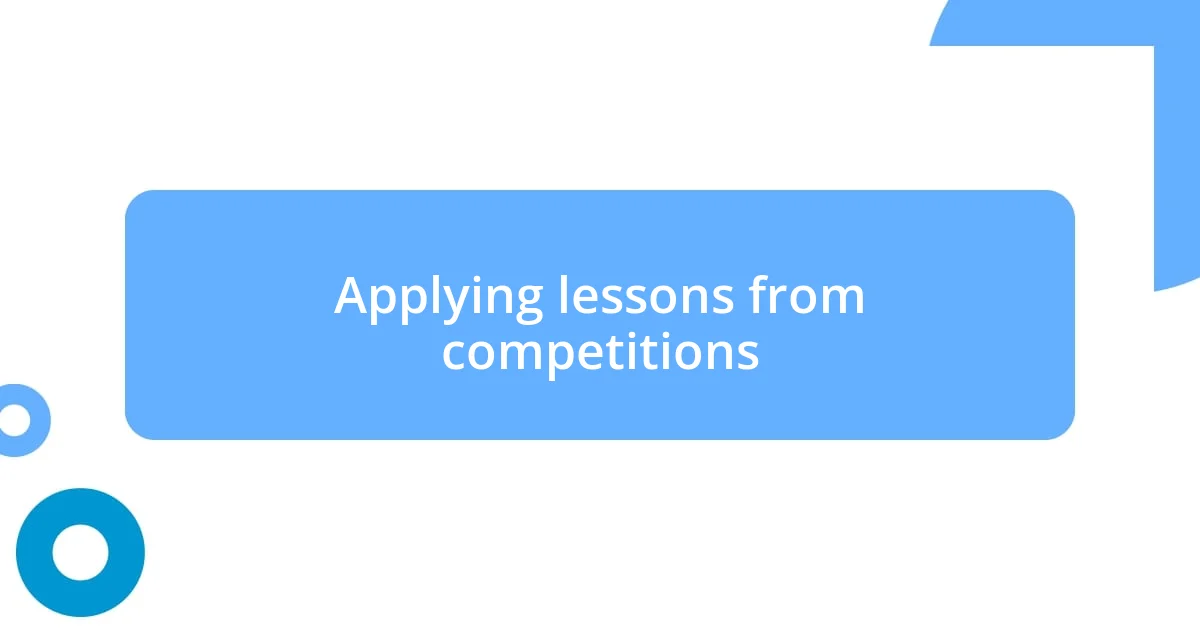
Applying lessons from competitions
Applying the lessons learned from robotics competitions is a powerful way to enhance skills beyond the arena. For instance, during one competition, the pressure was immense, yet it was in those moments that I discovered my ability to remain calm under fire. Have you ever encountered a situation where the stakes were high, and you surprised yourself with how you handled it? I came to appreciate that maintaining composure allows for clearer thinking and better decision-making when everything is on the line.
One unforgettable experience was when we had to make last-minute adjustments to our robot right before a match. It was a scramble, and I felt the weight of the world on my shoulders. But collaborating with my teammates in that frantic atmosphere revealed an important lesson about adaptability. This flexibility not only proved essential in races and challenges but also spilled over into my everyday life. I’ve found that the ability to pivot when plans change is invaluable—don’t you think it helps us tackle life with a more resilient mindset?
I’ve also learned that reflection is crucial after each competition. After our last event, I took time to think about what worked and what didn’t. This introspection revealed behavioral patterns and strategies that needed tweaking for the next round. I realized that without this practice of reflecting, we might overlook opportunities for growth. How often do you pause to evaluate your experiences? For me, ruminating on what we’ve achieved—and where we fell short—fuelled my commitment to continuous improvement. Each lesson learned becomes a building block for future success.
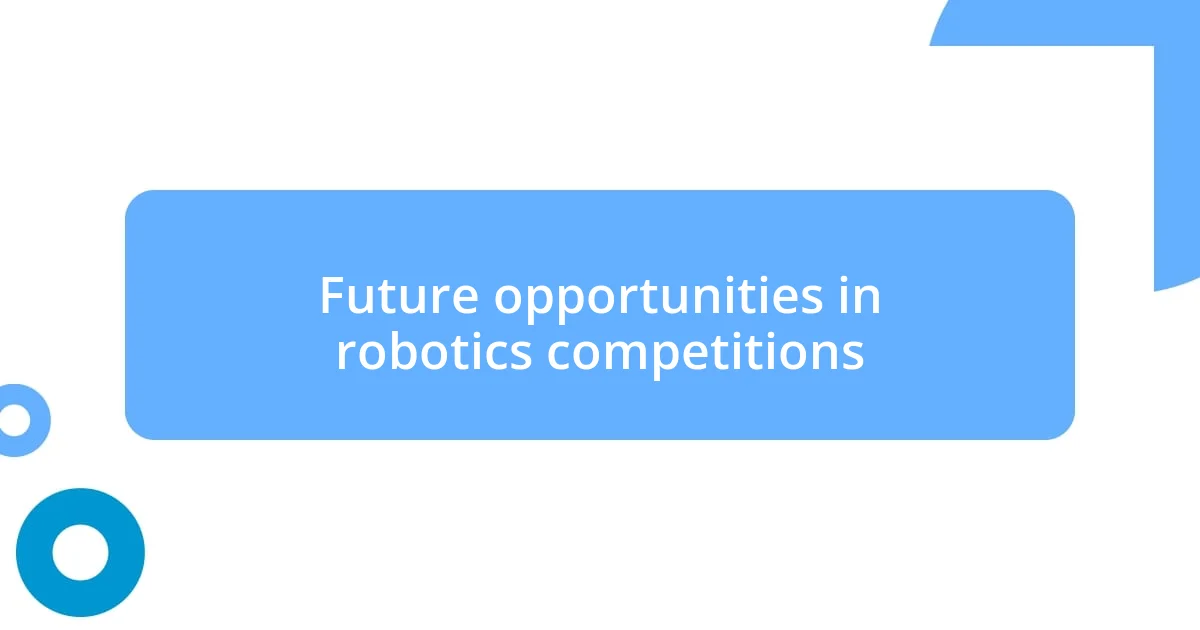
Future opportunities in robotics competitions
The future of robotics competitions is incredibly promising, paving the way for various opportunities. I remember attending a regional competition where not only did I meet industry professionals, but I also had the chance to connect with potential mentors. It’s fascinating how these events serve as networking hubs, creating pathways to internships or jobs that might not have been on my radar. Have you ever thought about how a simple encounter can change your career trajectory?
Looking ahead, I see robotics competitions evolving with technology, introducing areas like artificial intelligence and machine learning. The prospect of designing robots that can learn and adapt in real-time is thrilling. I actually participated in a workshop where we explored these advancements, and it left me eager to dive deeper into this field. Understanding these innovations could also give competitors a competitive edge—imagine facing off against a robot that predicts its opponent’s moves!
Moreover, robotics competitions are expanding on global platforms, which opens doors for cross-cultural collaboration. I had the privilege of joining a virtual competition with teams from different countries, sharing ideas and approaches that broadened my perspective. This experience was not just about competition; it was a lesson in collaboration and learning from diverse viewpoints. How can we harness that collective knowledge to create more advanced technology? I believe the answer lies in the future of these competitions, where every participant contributes to a larger conversation.





